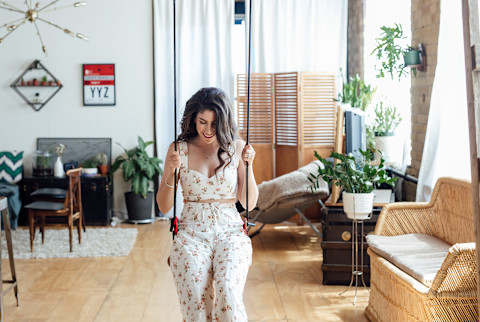
According to the National Alliance on Mental Illness, one in five Americans suffer from mental illness, depression is the leading cause of disability worldwide, and 18 percent of U.S. adults live with anxiety disorders. While traditional wellness practices can play a big role in achieving balance and feeling better, it's often not the whole story. In light of World Mental Health Day, we wanted to start a conversation about the many ways a person can be "well"—particularly, as wellness blogger and health blogger The Healthy Maven addresses in the piece, listening to one's own body and needs.
I've been anxious for as long as I can remember. Of course, hindsight is 20/20 and it's always easy to connect the dots backward. My first real understanding that what I was experiencing wasn't just a moment of worry didn't come until I left for college at 18. Transitions are known to induce anxiety in those predisposed to it, so it's no surprise that when I packed my bags, moved to a strange city, and began a new chapter in my life, my "worries" began to rear their ugly head.
While most college kids were out partying and making friends, I spent the majority of my first year trying to remain unnoticed between my dorm room and the library. I didn't quite know what was happening to me. I'd always been an outgoing, social person who had never had trouble making friends, but suddenly the world felt overwhelming. Making new friends, managing my course load, and living on my own was too much for me to handle—yet I looked around and it appeared no one else was having trouble balancing all the newness. I had never felt so alone.
That year would end up being one of the hardest of my life but also the most growth-inducing. I'll never forget the deep loneliness and fear that followed me each day, but it also led me to seek help and finally receive a diagnosis of generalized anxiety disorder (GAD) and depression.
The thing about anxiety is that it's rarely something you recover from—it's something you learn to live with and manage.
My anxiety manifested in several different ways. I started avoiding social situations. My eating became disordered, and I suffered from horrible digestive issues. I no longer felt like myself. Unfortunately, I was very good at masking what I was feeling from those who loved me. Fortunately, I knew that what I was experiencing wasn't normal or OK. Despite my fear and the stigma surrounding therapy, I knew I needed to seek professional help. That year, I saw several therapists before I eventually landed on a psychiatrist who helped me understand what was happening in my body and work through the perpetual anxiety I couldn't shake. It was also when I made the decision to start medication to treat my anxiety and depression.
I wish I could say my life turned around from that moment forward. Spoiler alert: It didn't. The thing about anxiety is that it's rarely something you recover from—it's something you learn to live with and manage. Over the past 10 years, I've gotten to know my anxiety like a best friend. I know what triggers it. I know when my body is feeling vulnerable to it. I also continue to medicate it.
I'm a huge believer in holistic methods to treat anxiety. I meditate. I do yoga. I eat a diet full of plants and body- and soul-nourishing food. I've set boundaries around relationships and work. I take supplements. I do all the things we're told to do to support our bodies, but it doesn't change the fact that I live with anxiety.
How do I know this? I've tried to go off my meds. With the support of my psychiatrist I attempted to taper off my meds. As expected, the side effects of coming off the meds were difficult. From shortness of breath to brain zaps (every time you turn your head you feel a zap in your brain!), I put up with them because I felt like a fraud writing about health and wellness (I have a blog, The Healthy Maven, and a podcast, That's So Maven) when I knew that my mental health depended on a synthetic pill.
It became clear that I needed to get over the story I was telling myself about medication and recognize what was best for me.
Eventually, the side effects dissipated—but my anxiety remained. No amount of meditation or yoga or essential oils could make it go away. In fact, all the work that went into trying to manage my mental health to avoid feeling anxious actually gave me anxiety. It felt like I was spending several hours a day trying to keep my anxiety at bay, which impeded my ability to do anything else. It became clear that I needed to get over the story I was telling myself about medication and recognize what was best for me.
One of the most healing pieces of my anxiety journey has been being open about it with my audience. I'm transparent about my mental health struggles and the many methods I use to support it, including medication. I take pride in the fact that I've built a successful business, have a wonderful partner and an incredibly supportive and amazing group of friends, all while living with anxiety. Does it flare up from time to time? Absolutely. But I now know how to manage it. I also know that big transitions are my greatest trigger, and in these moments I need a lot of extra support. And that's OK.
I am who I am today because of my anxiety, not in spite of it.
If you or a loved one is struggling with mental health, check out the American Psychological Association for a list of therapists near you, or visit the National Alliance on Mental Illness for more resources.
